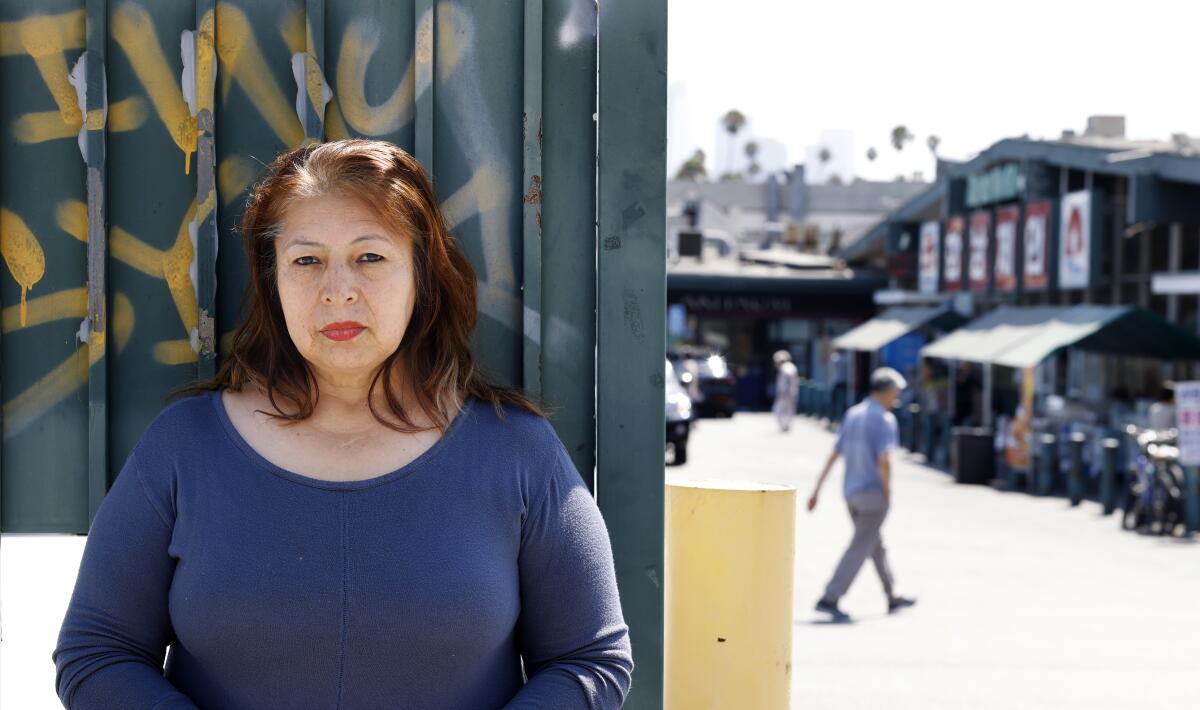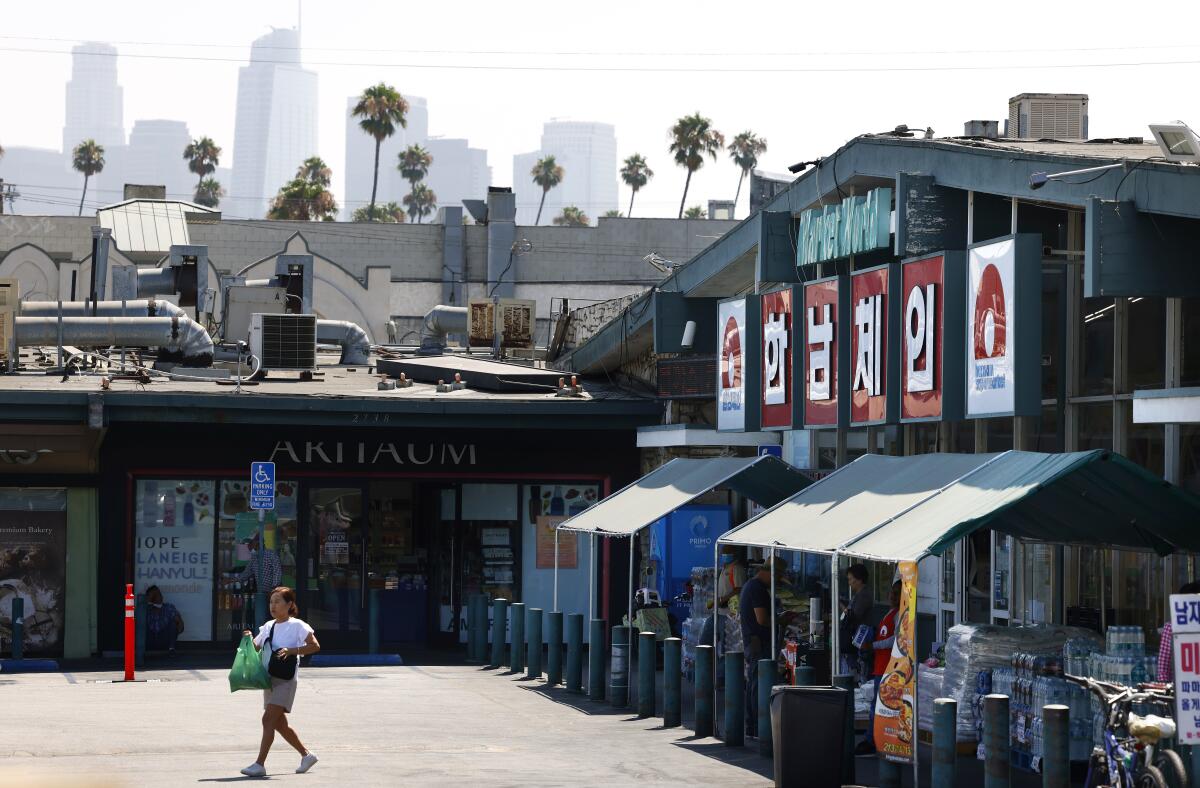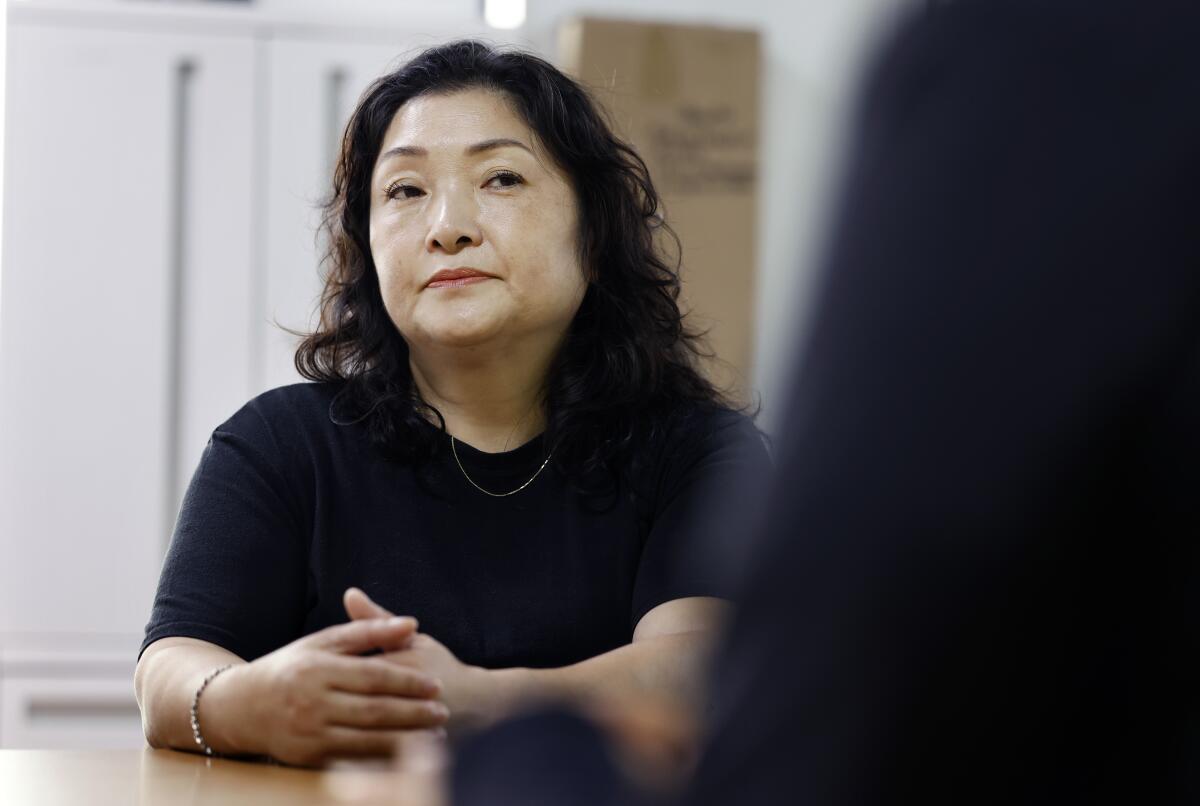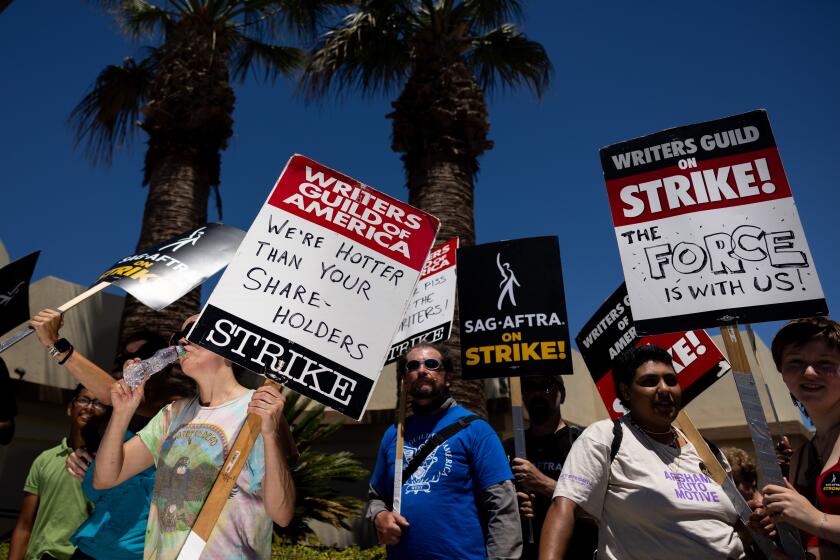Koreatown workers are fighting for unions. Why do essential workers still lack basic protections?

- Share via
There are few better salves for the pain of a cross-town drive than the prepared food sections of Koreatown grocery stores.
At Hannam Chain, I’ve been trying to settle on a favorite kimchi brand and sampling different types of banchan, small side dishes, made fresh and featuring a wider variety of vegetables than I’m used to.
Recently I met the woman who works in the kitchen where the food is prepared.
Technically, she used to work there, until the department was eliminated and outsourced. One day, Antonia Gonzalez was handed a list of product codes to memorize and given a new job. She was encouraged to view the cashier position as a promotion, but the pay was the same.
Gonzalez is a single parent caring for an autistic son, and felt she had no choice. She learned the product codes. There was no training, and her manager often snapped at her for asking questions. She struggled to deal with inebriated customers trying to buy alcohol, and her manager once threatened to fire her for bringing up the cockroaches she dodged at night.

Now she and other workers at Hannam Chain are seeking a union.
Scott Witlin, an attorney representing Hannam Chain, said the Koreatown Immigrant Worker’s Alliance used improper tactics to manipulate workers into supporting the union.
“This group has been flouting the law and making fraudulent claims about a number of Asian-owned businesses,” Witlin said.
This summer we’ve seen celebrities, TV writers, hotel employees, baristas and warehouse workers hit the picket lines. Many of us can no longer ignore that our lopsided economy seems designed to concentrate wealth in the hands of a few.
And the pandemic’s quarantine conditions exposed us to the reality that the workers at the bottom rungs of our economy are indispensable and often exploited. So we can’t be surprised that immigrant wage workers are demanding more.
Screenwriters have been walking picket lines since May 2, and there’s currently no end in sight. Actors also stopped work in mid-July, part of Los Angeles’ summer of labor strife.
Last year, workers and management at Genwa Korean BBQ ratified what organizers say is the first labor contract at a Korean restaurant in the United States. And a few months ago, a majority of the 157 workers of the American branch of Coway, a South Korean manufacturer of air purifying appliances, successfully voted for a union.
Note that each of these union battles is taking place in industries labeled essential during the pandemic: Restaurant workers, air filtration technicians and grocery employees. The bonhomie that spurred us to bang pots and pans in solidarity with the pandemic’s essential workers has not helped improve their conditions.
Latino workers experience labor law violations at nearly four times the rate of white workers, according to a KIWA survey. Foreign workers are more than twice as likely to experience wage theft, according to a 2010 UCLA study.

At Hannam Chain, workers allege that only employees of Korean descent get promoted, and I’ve heard similar complaints at businesses all over Koreatown.
Coway offers the type of job you might take if you are an immigrant who hopes to spend more time with your children and save up money for their college tuition. It is one of the largest air purifier companies in South Korea, with annual revenue often topping $3 billion, a publicly traded company that even enlists BTS to promote its products. Plus the hours are flexible, and the company offers commission.
A Coway maintenance worker’s duties include customer service, sales and upkeep of the company’s air filtration units that are available for rent. The work often adds up to more than 40 hours a week, but Mimi Deboer and other employees said they earn the salary and benefits of part-time workers.
Commission payments might help make up the difference, but workers allege the company withholds money for a variety of reasons. If the company wanted to offer a promotion on air filters, workers say, that came out of workers’ commission checks. It expected workers to help pay part of the customer’s fees with their commission, said Deboer. And raises almost never happen. Eunae Park, who has toiled there for seven years says she’s only gotten one 50-cent raise in that entire time.

Beyond pay issues, workers feel mistreated, undervalued and exploited. Deboer said they were being asked to enter customers’ apartments to clean and replace filters, but the company did not provide them with their own protective gear.
“During the pandemic, the company made more money than ever, but we didn’t get any benefit whatsoever,” Deboer said.
Though workers voted for a contract, union organizers say Coway hasn’t responded to any of their contract proposals for nearly a year. Coway did not return a call requesting comment.
Genwa, where a plate of galbi costs around $75, is reportedly the first Korean barbecue restaurant in the country to unionize.
When I wrote about labor abuses at Korean barbecue restaurants in 2019, I tried to explain that many business owners are themselves immigrants and renters, caught in a system of exploitation they did not create.
But the owner of Hannam Chain grocery stores is Dr. Kee Whan Ha, one of the richest men in Koreatown. He is known for his Korean-language radio broadcasts during the L.A. riots in 1992 exhorting merchants to defend their businesses. He also is the president of Hankook Property Management, a company that owns properties all over Koreatown.
And Coway is a profitable company, according to its quarterly financial filings. Such businesses and business owners should be able to afford to treat their workers right.
“These workers are just saying, we are holding up this economy,” said Alexandra Suh, executive director of Koreatown Immigrant Worker’s Alliance. “We should be able to benefit from it as well.”

These companies should offer sick days, insurance and safe working conditions. These employees do not deserve to be stuck with jobs that exploit and disrespect them.
After our conversation, Gonzalez sat back in her chair and took a deep breath. Her shift began in 10 minutes.
“At first I was so scared, but I became stronger because I desire a change. Everybody has just let management step all over us. And I just think everyone needs to get on board, because the fact is that we all need a change,” Gonzalez said.
Then she walked down the street to the grocery store to spend another day standing behind the register.
More to Read
Sign up for Essential California
The most important California stories and recommendations in your inbox every morning.
You may occasionally receive promotional content from the Los Angeles Times.
















